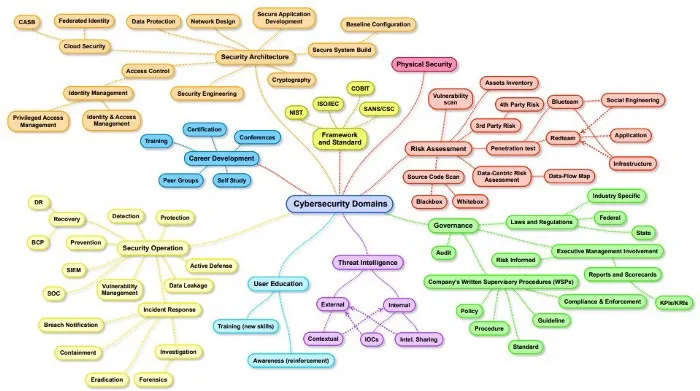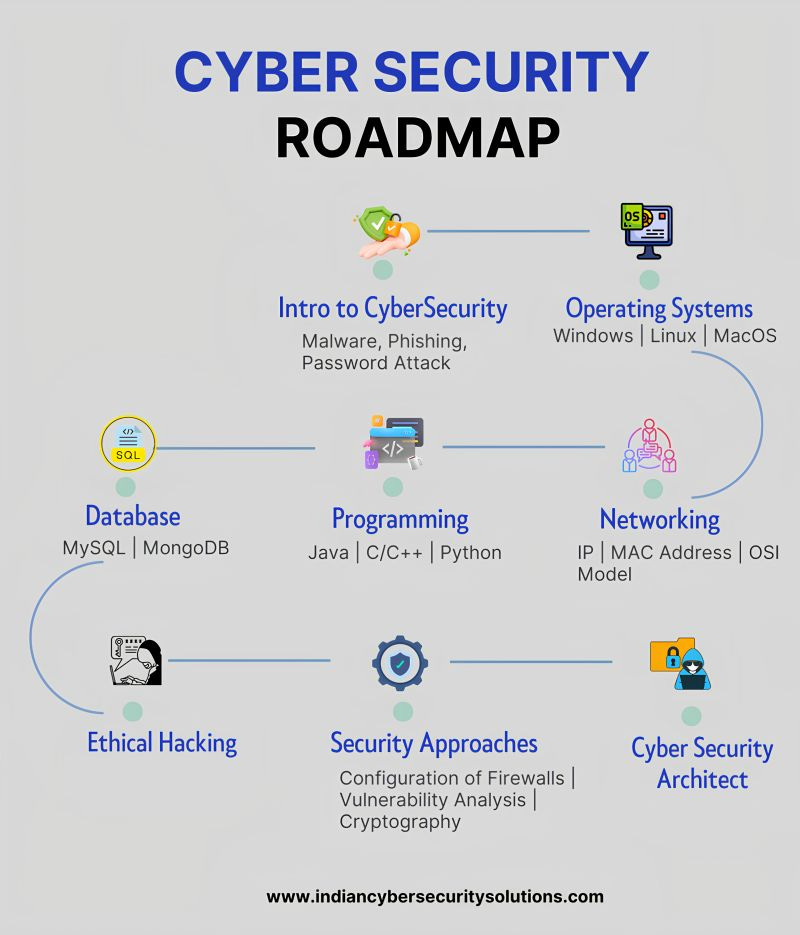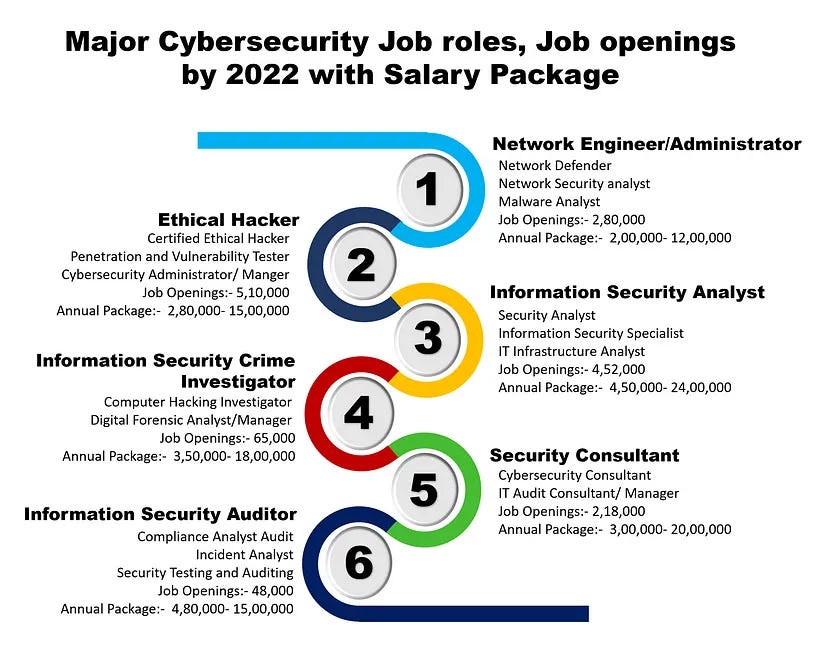Mastering Cybersecurity: A Guide to Safeguarding the Digital Realm
Cybersecurity is the practice of protecting digital systems, networks, and data from unauthorized access, cyber attacks, and data breaches. Cybersecurity specialists play a vital role in safeguarding sensitive information for individuals, organizations, and governments by implementing security measures, detecting vulnerabilities, and responding to security incidents.
Common Tasks in Cybersecurity:
In the dynamic field of cybersecurity, your role revolves around a blend of detective work, strategy, and rapid response. Picture yourself as a digital detective, constantly uncovering hidden threats and safeguarding the virtual realm from cyber villains.
Your tasks are like a cybersecurity playbook, with each chapter packed with exciting challenges:
Detective Work: You'll embark on thrilling missions to test, analyze, and implement security measures. It's like solving a high-tech puzzle, where you assess existing systems for vulnerabilities and outsmart cyber threats before they strike.
Fortifying Defenses: Imagine yourself as the guardian of digital fortresses, meticulously managing system vulnerabilities. Your job is to conduct thorough assessments, prioritize remediation efforts, and fortify defenses against cunning cyber adversaries.
Swift Response: When cyber villains strike, you're the first responder, leaping into action like a digital superhero. You'll monitor network traffic, investigate breaches, and execute swift incident response plans to protect digital assets and thwart attackers.
Strategic Planning: As a cybersecurity expert, you're also a master strategist, devising comprehensive threat prevention strategies. You'll design and deploy security policies, craft innovative defense mechanisms, and spearhead ongoing education and training initiatives to stay one step ahead of cyber threats.
Effective Communication: Just like a skilled communicator, you'll ensure everyone is on the same page when it comes to cybersecurity resilience. You'll craft compelling reports, host engaging discussions, and keep stakeholders informed about emerging risks and collaborative efforts to bolster cybersecurity defenses.
So, if you're ready to embark on an exhilarating journey into the world of cybersecurity, gear up, because every day brings new challenges and opportunities to defend the digital realm!
Skills Required for Cybersecurity:
Technical Proficiency:
Knowledge of operating systems, networking, and cybersecurity technologies.
Understanding of common security threats, attack vectors, and defense mechanisms.
Ethical Hacking and Penetration Testing:
Experience with ethical hacking techniques and penetration testing methodologies.
Familiarity with tools and frameworks for assessing and exploiting security weaknesses.
Risk Management and Compliance:
Understanding of risk management frameworks, regulatory requirements, and compliance standards.
Ability to assess and mitigate security risks while ensuring compliance with relevant laws and regulations.
Tools Used in Cybersecurity:
Network Security Monitoring Tools: Splunk, Argus, Wireshark, Suricata, and Snort for monitoring and analyzing network traffic and detecting anomalies.
Encryption Tools: VeraCrypt, TrueCrypt, OpenSSL, and GPG for encrypting sensitive data and communications to maintain confidentiality.
Vulnerability Scanners: Nessus, OpenVAS, Nexpose, Qualys, and Acunetix for scanning systems and applications for security vulnerabilities and misconfigurations.
Security Information and Event Management (SIEM) Systems: IBM QRadar, LogRhythm, ArcSight, and Elastic SIEM for aggregating, correlating, and analyzing security event logs for threat detection and response.
Endpoint Detection and Response (EDR) Solutions: CrowdStrike Falcon, Carbon Black, SentinelOne, and Sophos Intercept X for monitoring and responding to threats on endpoints and endpoints.
Cybersecurity Competitons:
1. InCTF -InCTF is a National level Ethical Hacking contest organized annually by Team bi0s in association with Amrita Vishwa Vidyapeetham and Amrita Centre for Cyber Security. The contest is exclusively for students enrolled in an Indian university and aimed at students who have no prior exposure to computer security and for the working professionals. Started in 2010 and so far over 15,000 university students across India from 22 states have taken part.
2. GoogleCTF -As Google organizes various geeky contests over a year, it also organizes the world’s best cyber hacking competition GoogleCTF. This contest consists of two events where the first event is a qualifier round. Here they cover a wide area of security exercises to test the security skills of the participants. From this first round, Google selects a number of teams to participate in the final round that will be held at the on-site location of Google office. The top 10 teams invited to the finals, compete onsite for a prize pool of more than USD $31,337.
https://capturetheflag.withgoogle.com/
3. Pwn2Win CTF -Pwn2Win CTF is the online jeopardy style CTF. It is organized by the Epic Leet team, a Brazilian CTF team. The CTF is designed for advanced and intermediate players. The duration of the event is 48 hours straight. The prizes are as follows – Top 1: Internet Fame level Gold + Personalized Certificates, Top 2: Internet Fame level Silver + Personalized Certificates, Top 3: Internet Fame level Bronze + Personalized Certificates. The personalized certificates are just like “medals” from the event, something that you will use to testify your participation and Top 3 in this hardcore competition.
4.DEF CON -DEF CON is one of the biggest and also the oldest hacker’s summit, held annually in Las Vegas(USA). First, it took place in June 1993. DEF CON includes cybersecurity researchers, journalists, federal government agents, security professionals, students. The Black Badge is the greatest award DEF CON gives to contest winners. Actually, prize money is not fixed but last year 2019, seven finalists competed against each other for 2M$ grand prize money.
https://www.defcon.org/index.html
5. ASIS CTF Quals- ASIS CTF is the online jeopardy format CTF. This event is organized by the asis team, It is an academic team of Iran. In this event, there are some set of challenges categories like Crypto, Web, Reverse Engineering, Pwn, and Forensics. Also, there is no limit to the number of team members.
CyberSecurity Project Ideas
Discover a handpicked selection of GitHub repositories tailored to kickstart your cybersecurity journey. Dive into these projects to gain practical experience and skills that you can proudly display on your resume. Whether you're just starting out or looking to advance your expertise, these resources offer a wealth of opportunities to learn and grow in the field of cybersecurity. Explore the curated list at GitHub Cybersecurity Projects and embark on your path to becoming a proficient cybersecurity practitioner.
How BITS can help?
CS G513 Network Security: This course specifically focuses on network security principles and techniques, covering topics such as encryption, firewalls, intrusion detection/prevention systems, and secure protocols. It provides essential knowledge for securing networks, which is fundamental in cybersecurity.
CS F303 Computer Networks: Understanding computer networks is crucial for cybersecurity, as it forms the backbone of information exchange and communication. This course covers topics such as TCP/IP, routing, network security protocols, and more, providing foundational knowledge for securing network infrastructures.
BITS F463 Cryptography: It is a comprehensive course dedicated to the study of cryptographic principles and techniques. Covering a wide range of topics, including encryption algorithms, digital signatures, hash functions, and key management, this course equips students with the essential knowledge and skills needed to secure digital communications and protect sensitive data. By delving into the intricacies of cryptographic protocols and applications, students gain a deep understanding of how cryptography forms the foundation of modern cybersecurity practices.
CS F415 Data Mining and CS G520 Advanced Data Mining(WILP): Data mining techniques are valuable in cybersecurity for detecting anomalies, identifying patterns, and extracting meaningful insights from large datasets. This advanced course covers advanced data mining algorithms and applications, which can be applied to cybersecurity tasks such as threat intelligence analysis and malware detection.






